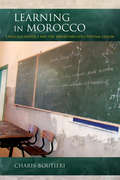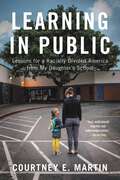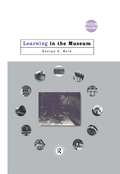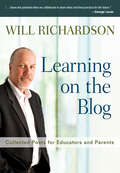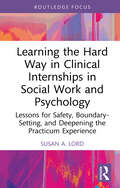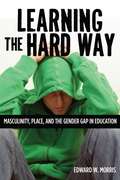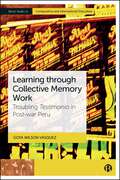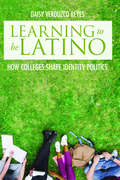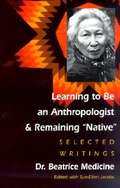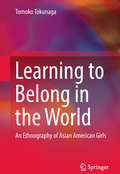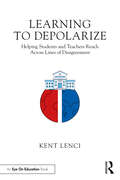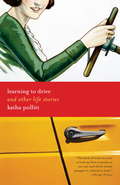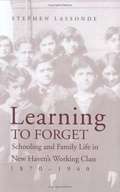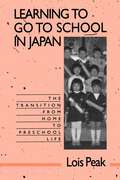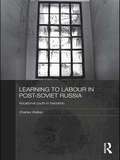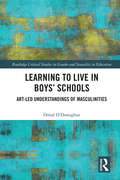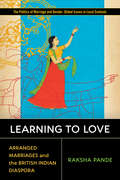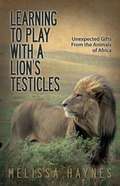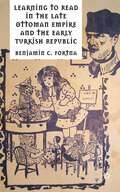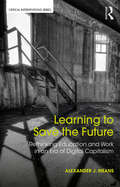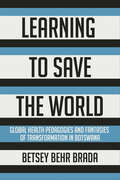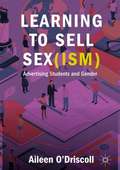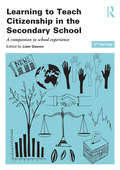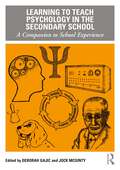- Table View
- List View
Learning in Morocco: Language Politics and the Abandoned Educational Dream
by Charis BoutieriLearning in Morocco offers a rare look inside public education in the Middle East. While policymakers see a crisis in education based on demographics and financing, Moroccan high school students point to the effects of a highly politicized Arabization policy that has never been implemented coherently. In recent years, national policies to promote the use of Arabic have come into conflict with the demands of a neoliberal job market in which competence in French is still a prerequisite for advancement. Based on long-term research inside and outside classrooms, Charis Boutieri describes how students and teachers work within, or try to circumvent, the system, whose contradictory demands ultimately lead to disengagement and, on occasion, to students taking to the streets in protest.
Learning in Public: Lessons for a Racially Divided America from My Daughter's School
by Courtney E. MartinOne mother&’s story of enrolling her daughter in a local public school, and the surprising, necessary lessons she learned with her neighbors.From the time Courtney E. Martin strapped her daughter, Maya, to her chest for long walks, she was curious about Emerson Elementary, a public school down the street from her Oakland home. She learned that White families in their gentrifying neighborhood largely avoided the majority-Black, poorly-rated school. As she began asking why, a journey of a thousand moral miles began. Learning in Public is the story, not just Courtney&’s journey, but a whole country&’s. Many of us are newly awakened to the continuing racial injustice all around us, but unsure of how to go beyond hashtags and yard signs to be a part of transforming the country. Courtney discovers that her public school, the foundation of our fragile democracy, is a powerful place to dig deeper. Courtney E. Martin examines her own fears, assumptions, and conversations with other moms and dads as they navigate school choice. A vivid portrait of integration&’s virtues and complexities, and yes, the palpable joy of trying to live differently in a country re-making itself. Learning in Public might also set your family&’s life on a different course forever.
Learning in the Museum (Museum Meanings)
by George E. HeinLearning in the Museum examines major issues and shows how research in visitor studies and the philosophy of education can be applied to facilitate a meaningful educational experience in museums. Hein combines a brief history of education in public museums, with a rigorous examination of how the educational theories of Dewey, Piaget, Vygotsky and subsequent theorists relate to learning in the museum. Surveying a wide range of research methods employed in visitor studies is illustrated with examples taken from museums around the world, Hein explores how visitors can best learn from exhibitions which are physically, socially, and intellectually accessible to every single visitor. He shows how museums can adapt to create this kind of environment, to provide what he calls the 'constructivist museum'. Providing essential theoretical analysis for students, this volume also serves as a practical guide for all museum professionals on how to adapt their museums to maximize the educational experience of every visitor.
Learning on the Blog: Collected Posts for Educators and Parents
by Willard H. RichardsonEducation reform: We don’t need better, we need different Today’s students are immersed in the digital age, but can our educational system keep up? Best-selling author Will Richardson's comprehensive collection of posts from his acclaimed blog, weblogg-ed.com, spells out the educational reform we must achieve. The book’s entries present a multifaceted vision of the 21st-century classroom and describe how a social media-changed world has created new opportunities for: Project-based learning Student-created media that develops critical thinking Extending learning beyond the classroom and school hours Cooperative and collaborative learning Student empowerment and career readiness
Learning the Hard Way in Clinical Internships in Social Work and Psychology: Lessons for Safety, Boundary-Setting, and Deepening the Practicum Experience (ISSN)
by Susan A. LordIn this book, Susan A. Lord shares important stories and lessons from two undergraduate and two postgraduate clinical internships as colorful narratives that will augment texts in undergraduate and graduate practicum seminar classes. The chapters engage with fundamental issues, including the importance of safety and relationship-building, good supervision, the complexities of situationally determining what constitutes ethical practice, boundary-setting, suicide assessment, and professional identity development. Narratives about making mistakes, or "learning the hard way", include being robbed at gunpoint in Chicago, being stalked by a client, and sexual harassment. Each chapter concludes with a list of reflection, small group discussion, and class discussion questions designed to help the reader more deeply engage with the material on a personal, academic, and professional level. Written for students who are excited to begin their practicum experiences, this book explores how these experiences might be addressed and crucially stresses the importance of remembering that everyone is human and that clients are well-defended and resilient. A valuable resource for learning about the importance of safety, boundaries, and relationship development in any internship or practicum experience, it will appeal to students and scholars with interests in psychoanalysis, internship education, and relational psychotherapy.
Learning the Hard Way: Masculinity, Place, and the Gender Gap in Education
by Edward W. MorrisAn avalanche of recent newspapers, weekly newsmagazines, scholarly journals, and academic books has helped to spark a heated debate by publishing warnings of a "boy crisis" in which male students at all academic levels have begun falling behind their female peers. In Learning the Hard Way, Edward W. Morris explores and analyzes detailed ethnographic data on this purported gender gap between boys and girls in educational achievement at two low-income high schools--one rural and predominantly white, the other urban and mostly African American. Crucial questions arose from his study of gender at these two schools. Why did boys tend to show less interest in and more defiance toward school? Why did girls significantly outperform boys at both schools? Why did people at the schools still describe boys as especially "smart"? Morris examines these questions and, in the process, illuminates connections of gender to race, class, and place. This book is not simply about the educational troubles of boys, but the troubled and complex experience of gender in school. It reveals how particular race, class, and geographical experiences shape masculinity and femininity in ways that affect academic performance. His findings add a new perspective to the "gender gap" in achievement.
Learning through Collective Memory Work: Troubling Testimonio in Post-war Peru (Bristol Studies in Comparative and International Education)
by Goya Wilson VásquezThis book traces the process of producing testimonio with the children of the Tupac Amaru Revolutionary Movement (MRTA), an insurgent group during Peru’s internal war (1980–2000). It examines how the group navigates post-war struggles over memory while dealing with the ‘children of terrorists’ stigma. Drawing from a cycles of inquiry approach, the book theorizes three movements for memory work: a realist presentation of testimonial narratives, a ‘politics of memory’ engaging with the conditions of production and a ‘poetics of memory’ that troubles memory, voice and representation for qualitative inquiry in post-war contexts. Challenging the notion of war-torn countries as pure devastation, the author invites readers to see them as sites of knowledge and creativity, with much to offer for education, peace studies and social justice research.
Learning to Be Latino: How Colleges Shape Identity Politics (Critical Issues in American Education)
by Daisy Verduzco ReyesIn Learning to Be Latino, sociologist Daisy Verduzco Reyes paints a vivid picture of Latino student life at a liberal arts college, a research university, and a regional public university, outlining students’ interactions with one another, with non-Latino peers, and with faculty, administrators, and the outside community. Reyes identifies the normative institutional arrangements that shape the social relationships relevant to Latino students’ lives, including school size, the demographic profile of the student body, residential arrangements, the relationship between students and administrators, and how well diversity programs integrate students through cultural centers and retention centers. Together these characteristics create an environment for Latino students that influences how they interact, identify, and come to understand their place on campus. Drawing on extensive ethnographic observations, Reyes shows how college campuses shape much more than students’ academic and occupational trajectories; they mold students’ ideas about inequality and opportunity in America, their identities, and even how they intend to practice politics.
Learning to Be an Anthropologist and Remaining "Native"
by Beatrice MedicineNative American anthropologist considers many aspects of life on various Sioux reservations
Learning to Belong in the World: An Ethnography Of Asian American Girls
by Tomoko TokunagaThis book provides a complex and intricate portrayal of Asian American high school girls – which has been an under-researched population – as cultural meditators, diasporic agents, and community builders who negotiate displacement and attachment in challenging worlds of the in-between. Based on two years of ethnographic fieldwork, Tomoko Tokunaga presents a portrait of the girls’ hardships, dilemmas, and dreams while growing up in an interconnected world. This book contributes a new understanding of the roles of immigrant children and youth as agents of globalization and sophisticated border-crossers who have the power and agency to construct belonging and identity across multiple contexts, spaces, times, activities, and relationships. It has much to offer to the construction of educative communities and spaces where immigrant youth, specifically immigrant girls, can thrive.
Learning to Change Lives
by A. Ka TsangThe Strategies and Skills Learning and Development (SSLD) system is an action-oriented model for enabling clients in social work, health, mental health, and human services settings to address their needs and life goals. In Learning to Change Lives, author A. Ka Tat Tsang introduces SSLD's powerful framework and practice, which has been developed based on three decades of experience in psychotherapy, counselling, education, training, consultation, and community service.Learning to Change Lives provides detailed, step-by-step guidelines for SSLD intervention - starting with engagement with the client, assessment, translating problems into intervention plans, systematic learning and development of appropriate strategies and skills. Key practice procedures are described clearly and illustrated by case examples, specific instructions, and sample worksheets. Aimed at clinical practitioners, mental health professionals, social workers, and other human service professionals, this book can be used as a manual by practitioners and as a textbook for courses and training programs.
Learning to Depolarize: Helping Students and Teachers Reach Across Lines of Disagreement
by Kent LenciHow can schools shoulder some responsibility for depolarizing our fractured American society? In this provocative new book, Kent Lenci describes how educators can tackle the challenge of preparing students to communicate and collaborate across lines of deep disagreement—to face the political and ideological "other"—despite the conventional wisdom that schools should be apolitical. Topics covered include the causes and consequences of political polarization in our society, why schools must address the challenge head-on, bridge-building in the classroom, media literacy and social emotional learning as tools for depolarization, and partnering with parents across the divide. Each chapter offers current research as well as practical strategies and classroom anecdotes. Appropriate for teachers of all grade levels and subject areas, the book will help you reconsider your classroom and school’s role in forging a more depolarized future.
Learning to Drive
by Katha PollittNow a major motion picture starring Patricia Clarkson and Ben Kingsley. Celebrated for her award-winning political columns, criticism, and poetry, Katha Pollitt now shows us another side of her talent. Learning to Drive is a surprising, revealing, and entertaining collection of essays drawn from the author's own life. With deep feeling and sharp insight, Pollitt writes about the death of her father; the sad but noble final days of a leftist study group of which she was a member; and the betrayal and heartbreak inflicted by a man who seriously deceived her. (Her infinitely patient, gentle driving instructor points out her weakness--"Observation, Katha, observation!") She also offers a candid view of her preoccupation with her ex-lover's haunting presence on the Internet, and her search there for a secret link that might provide a revelation about him that will Explain Everything. Other topics include the differences between women and men--"More than half the male members of the Donner party died of cold and starvation, but three quarters of the females survived, saved by that extra layer of fat we spend our lives trying to get rid of"--and the practical implications of political theory: "What if socialism--all that warmhearted folderol about community and solidarity and sharing was just an elaborate con job, a way for men to avoid supporting their kids?" Learning to Drive demonstrates that while Katha Pollitt is undeniably one of our era's most profound observers of culture, society, and politics, she is just as impressively a wise, graceful, and honest observer of her own and others' human nature.
Learning to Forget: Schooling and Family Life in New Haven's Working Class, 1870-1940
by Stephen LassondeThis book offers an insightful view of the complex relations between home and school in the working-class immigrant Italian community of New Haven, Connecticut. Through the lenses of history, sociology, and education, Learning to Forget presents a highly readable account of cross-generational experiences during the period from 1870 to 1940, chronicling one generation's suspicions toward public education and another's need to assimilate. Through careful research Lassonde finds that not all working class parents were enthusiastic supporters of education. Not only did the time and energy spent in school restrict children's potential financial contributions to the family, but attitudes that children encountered in school often ran counter to the family's traditional values. Legally mandated education and child labor laws eventually resolved these conflicts, but not without considerable reluctance and resistance.
Learning to Go to School in Japan: The Transition from Home to Preschool Life
by Lois PeakJapanese two-year-olds are indulged, dependent, and undisciplined toddlers, but by the age of six they have become obedient, self-reliant, and cooperative students. When Lois Peak traveled to Japan in search of the "magical childrearing technique" behind this transformation, she discovered that the answer lies not in the family but in the preschool, where teachers gently train their pupils in proper group behavior. Using case studies drawn from two contrasting schools, Peak documents the important early stages of socialization in Japanese culture.Contrary to popular perceptions, Japanese preschools are play-centered environments that pay little attention to academic preparation. It is here that Japanese children learn their first lessons in group life. The primary goal of these cheerful--even boisterous--settings is not to teach academic facts of learning-readiness skills but to inculcate behavior and attitudes appropriate to life in public social situations.Peak compares the behavior considered permissible at home with that required of children at preschool, and argues that the teacher is expected to be the primary agent in the child's transition. Step by step, she brings the socialization process to life, through a skillful combination of classroom observations, interviews with mothers and teachers, transcripts of classroom events, and quotations from Japanese professional literature.
Learning to Labour in Post-Soviet Russia: Vocational youth in transition (BASEES/Routledge Series on Russian and East European Studies)
by Charles WalkerThis book explores the changing nature of growing-up working-class in post-Soviet Russia, a country dislocated by the experience of neo-liberal economic reform. Based on extensive ethnographic research in a provincial Russian region, it follows the experiences of vocational education graduates whose colleges continue to channel them into the ailing industrial and agricultural sectors. Rather than settling for transitions into ‘poor work’, the book shows how these young men and women develop a range of strategies aimed at overcoming the poverty of opportunity available to them in traditional enterprises, pursuing instead emerging opportunities in higher education, jobs in the new service sector and the prospect of migration. Drawing on a range of theoretical perspectives, Charles Walker analyses these strategies and their significance for wider processes of social change and social stratification in post-Soviet Russia.
Learning to Live in Boys’ Schools: Art-led Understandings of Masculinities (Routledge Critical Studies in Gender and Sexuality in Education)
by Donal O'DonoghueThis book is about boys’ experiences of being educated in independent single-sex schools in Canada. These experiences, which are oftentimes attributed to particular places and moments at school, reveal ways in which school places are both "companionable" and "influential" in how boys become available to themselves and others as they pursue the possibility of becoming somebody. Curious about how masculinities show up in places at school and studying the sorts of gendered subjectivities that such places invite, entice, support and deny, the book extends beyond traditional ways of thinking and writing about the production of masculinities in education by introducing a different set of conceptual orientations and inquiry practices, including post-masculinities, weak theory, and art-led research and thought practices.
Learning to Love: Arranged Marriages and the British Indian Diaspora (Politics of Marriage and Gender: Global Issues in Local Contexts)
by Raksha PandeLearning to Love moves beyond the media and policy stereotypes that conflate arranged marriages with forced marriages. Using in-depth interviews and participant observations, this book assembles a rich and diverse array of everyday marriage narratives and trajectories and highlights how considerations of romantic love are woven into traditional arranged marriage practices. It shows that far from being a homogeneous tradition, arranged marriages involve a variety of different matchmaking practices where each family tailors its own cut-and-paste version of British-Indian arranged marriages to suit modern identities and ambitions. Pande argues that instead of being wedded to traditions, people in the British-Indian diaspora have skillfully adapted and negotiated arranged marriage cultural norms to carve out an identity narrative that portrays them as "modern and progressive migrants"–ones who are changing with the times and cultivating transnational forms of belonging.
Learning to Play With a Lion's Testicles
by Melissa HaynesThe cheeky title of Melissa Haynes's story of adventure in Africa, Learning to Play with a Lion's Testicles, earned the book some big publicity on NBC-TV/Late Night with Jimmy Fallon on September 4,2013 where it topped the show's list of "Titles Not to Read" for September 2013. Melissa's book was also a big smash on the March 11, 2014 Ellen Show, where Ellen and guest Ricky Gervais highlighted the book throughout the entire hour. Playing with a lion's testicles: An African saying that means to take foolhardy chances.Melissa, an exhausted executive from the city seeks meaning and purpose from her work, and volunteers for a Big Five conservation project in South Africa. Her boss, an over-zealous ranger, nicknamed the Drill Sergeant, has no patience for city folk, especially if they're women, and tries to send her packing on day one. But Melissa stands her ground with grit and determination, however shaky it may be.Conflict soon sets the pace with a cast filled with predatory cats, violent elephants, and an on-going battle of wits with the Drill Sergeant. Even Mother Nature pounds the reserve with the worst storm in a century. But the most enduring and profound conflict is the internal battle going on within Melissa, as she tries to come to terms with the guilt surrounding her mother's death. When death grips the game reserve, it is the very animals Melissa has come to save that end up saving her.For the reader who has ever dreamed of going to Africa or knows the pain of loss and guilt, LEARNING TO PLAY WITH A LION'S TESTICLES will fill your soul.
Learning to Read in the Late Ottoman Empire and the Early Turkish Republic
by Benjamin C. FortnaAn exploration of the ways in which children learned and were taught to read, against the background of the transition from Ottoman Empire to Turkish Republic. This study gives us a fresh perspective on the transition from empire to republic by showing us the ways that reading was central to the construction of modernity.
Learning to Save the Future: Rethinking Education and Work in an Era of Digital Capitalism (Critical Interventions)
by Alexander J. MeansMainstream economists and Silicon Valley entrepreneurs claim that unfettered capitalism and digital technology can unlock a future of unbounded prosperity, create endless high paying jobs, and solve the world’s vast social and ecological problems. Realizing this future of abundance purportedly rests in the transformation of human potential into innovative human capital through new 21st century forms of education. In this new book Alex Means challenges this view. Stagnating economic growth and runaway inequality have emerged as the ‘normal’ condition of advanced capitalism. Simultaneously, there has been a worldwide educational expansion and a growing surplus of college-educated workers relative to their demand in the world economy. This surplus is complicated by an emerging digital revolution driven by artificial intelligence and machine learning that generates worker displacing innovations and immaterial forms of labor and valorization. Learning to Save the Future argues that rather than fostering mass intellectuality, educational development is being constrained by a value structure subordinated to 21st century capitalism and technology. Human capabilities from creativity, design, engineering, to communication are conceived narrowly as human capital, valued in terms of economic productivity and growth. Similarly, global problems such as the erosion of employment and climate change are conceived as educational problems to be addressed through business solutions and the digitalization of education.?This thought-provoking account provides a cognitive map of this condition, offering alternatives through critical analyses of education and political economy, technology and labor, creativity and value, power and ecology.
Learning to Save the World: Global Health Pedagogies and Fantasies of Transformation in Botswana
by Betsey Behr BradaLearning to Save the World provides an innovative analysis of how individuals inhabit, refuse, and reconfigure the contours of global health.In 2001, Botswana's government, faced with one of the highest HIV prevalence rates in the world, committed itself to sub-Saharan Africa's first free public HIV treatment program. US-based private foundations and medical schools offered support to demonstrate the feasibility of public HIV treatment in Africa. Given US interest and investment in global health, this support created opportunities for US physicians and medical trainees to interact with local practitioners, treat patients, and shape health policy in Botswana.Although global health has emerged as a powerful call to planetary moral action, the nature of this exhortation remains unclear. Is global health a new movement for social justice, or is it neocolonial, creating new dependencies under the banner of humanitarianism? Betsey Behr Brada shows that global health is a frontier, an imaginative framework that organizes the space, time, and ethics of encounter. Learning to Save the World reveals how individuals and collectivities engaged in global health—visiting experts as well as local clinicians and patients—come to regard themselves and others in terms of this framework.
Learning to Sell Sex(ism): Advertising Students and Gender
by Aileen O'DriscollThis book presents the first in-depth exploration into the gendered attitudes and worldviews of advertising students. Offering a significant contribution to other cultural sociological works concerning the cultural and creative industries, Learning to Sell Sex(ism) adds further weight to the argument that it is imperative that we look closely at the people who create media texts in order to better account for and challenge sexist media content. In this study, such media creators are the advertising industry’s next generation of practitioners and creatives. Involving a mix of in-depth questionnaires, qualitative surveys, interviews with students, observational data, as well as an examination of the components comprising advertising modules, O’Driscoll documents the dominant gendered discourses articulated by advertising students and offers an opportunity for the advertising educational sector to reflect on how it might play its part in reducing stereotypical and sexist content emanating from the industry. Learning to Sell Sex(ism) will be of interest to students and scholars across a range of disciplines, including media studies, gender studies, sociology, cultural studies and marketing.
Learning to Teach Citizenship in the Secondary School: A companion to school experience
by Liam GearonPraise for previous editions… 'A comprehensive and illuminating resource on both citizenship and citizenship education.'– David Hicks, Times Educational Supplement What is the role of citizenship? How can it be taught effectively? Learning to Teach Citizenship in the Secondary School is an essential resource for students training to teach citizenship in the secondary school as well as teachers of citizenship looking for fresh ideas and guidance. Written by leading experts in the field, the book is underpinned by the latest research and theory and explores a variety of inspirational approaches to teaching and learning in a subject which provides a critical underpinning to the whole school curriculum. This new, third edition has been comprehensively updated and restructured to emphasise the role of citizenship across the curriculum, exploring a wider range of subjects including geography, modern foreign languages, mathematics and science. Key topics include: historical origins and contemporary contexts developing subject knowledge and skills of enquiry effective lesson plans, schemes of work and assessment citizenship beyond the classroom: community-based work and learning outdoors citizenship across the curriculum: English, drama and media; history, geography and religious education; modern foreign languages; mathematics and science; and RE research in citizenship. Including key objectives and chapter summaries, together with carefully developed tasks to support your own professional development, Learning to Teach Citizenship in the Secondary School is designed to develop theoretically informed good practice in citizenship education. It is a source of support, guidance and creative ideas for all training citizenship teachers and those teaching the subject as non-specialists, and offers specialists new insight into this crucial subject.
Learning to Teach Psychology in the Secondary School: A Companion to School Experience (Learning to Teach Subjects in the Secondary School Series)
by Jock McGinty Deborah GajicLearning to Teach Psychology in the Secondary School offers a comprehensive and accessible introduction to the teaching and learning of psychology. Written for trainee teachers and those new to teaching psychology, it will help you to develop your subject knowledge and gain a deeper understanding of the purpose and potential of psychology within the secondary curriculum as well as support the practical skills needed to plan, teach, and evaluate stimulating and creative lessons. Drawing on theory and the latest research, the text demonstrates how key pedagogical issues link to classroom practice and encourages you to reflect on your own learning and practice to maximise student learning. Written by experts in the field and featuring useful resources, summaries of key points and a range of tasks enabling you to put learning into practice in the classroom, the chapters cover: Using psychology to teach psychology Teaching specific areas of psychology Ethics in psychology teaching Teaching research methods Teaching the skills of evaluation, analysis and application in psychology Assessment and feedback Inclusion Using technology Career progression and professional development This exciting new addition to the market leading Learning to Teach in the Secondary School series is essential reading for all those who aspire to become an inspirational and engaging psychology teacher.
